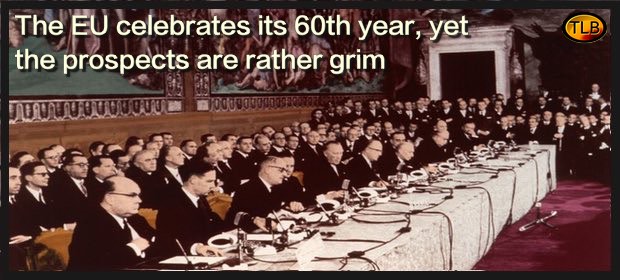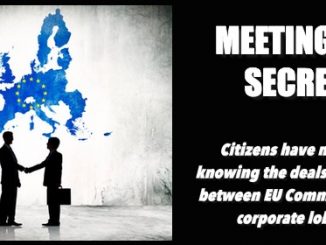
March 25: EU Marks 60th Anniversary
ANDREI AKULOV
On March 25, 1957, Belgium, France, Italy, Luxembourg, the Netherlands and West Germany signed the Treaties of Rome to create the European Economic Community (the Common Market). They laid the foundation for the European Union, which is today marking its 60th anniversary. The EU has expanded to 28 members, added 330 million inhabitants and increased GDP by 7 times. A free trade area formed by six countries has grown into an international entity with its own flag, anthem, currency, president, a diplomatic service and defense and security structures. This is the time to reflect on the past and assess the prospects for the future.
The Treaty establishing the European Economic Community removed tariffs and boosted the free movement of goods and free consumption to strengthen the prosperity of its citizens. There have been significant achievements in all spheres. The idea of a United Europe had been gaining momentum until recently. The process has slowed down due to the fact that the history of European integration is also a history of failures and mistakes, casting a long dark shadow over the celebrations.
As time has gone by, the organization, which started as a free trade area, has become a supranational entity, more like a federal state governed by an unelected, unknown, and unaccountable bureaucracy in Brussels. The EU has become notorious for overregulation and excessive centralization. Over the years, a large number of policy areas have been fully or partially ceded to Brussels. As a result, national elected public officials are left with no choice but to implement decisions taken in the EU headquarters.
While the EU Commission and the EU Parliament grew in power, the public interest and participation in EU institutions have steadily declined. The voter turnout in the first election of 1979 was 62%. In 2014, it declined to reach a nadir, 42.61% percent.
People cannot bring about needed changes in their countries through voting. Basic democratic principles are egregiously violated by the organization that likes to lecture others on democracy. Brussels policies prompted the rise of populist parties, opposing further integration and migration policy. Present in all member states, they hold one-third of all seats in the European Parliament.
Frustrated by the failure of the EU establishment and of the mainstream political parties at home to address economic problems and mass immigration, people are throwing their support behind “populist” parties. At some point, one of the EU’s 28 member states will elect an anti-EU government.
 Economic progress is slow. Much of Europe is not growing at all. Regulations emanating from Brussels must be applied equally throughout the Union but productivity across the EU differs widely. In 2015, for example, GDP per capita in Luxembourg, the EU’s richest state, was 14.9 times higher than that in Bulgaria, the EU’s poorest state.
Economic progress is slow. Much of Europe is not growing at all. Regulations emanating from Brussels must be applied equally throughout the Union but productivity across the EU differs widely. In 2015, for example, GDP per capita in Luxembourg, the EU’s richest state, was 14.9 times higher than that in Bulgaria, the EU’s poorest state.
Monetary policy has caused friction between nation states, with the rich nations like Germany and Austria on one side, and the failing countries “of the South” like Greece on the other. The North does not wish to continue subsidizing the inefficient South. Many people feel that they are being forced to adopt policies they do not like, while others feel that they have to unfairly subsidize people with whom they have nothing in common. For instance, the Netherlands is one of the big net contributors. With the UK gone, the country will be hard hit if it is necessary to compensate for the British contribution.
With no credible enforcement mechanisms, debt and deficit commitments are not observed. Under Article 125 of the Lisbon Treaty, each EU member state is responsible for its own debts. This rule was dodged to keep Greece afloat. Questions continue to bubble under the surface on matters such as the survivability of Greece, Italy and Portugal as members of the Eurozone.
Brussels under Germany’s strong influence has failed to find a solution to refugee flows from the Middle East and North Africa, alienating the countries of Central and Eastern Europe. Some member  states stand up to pressure from Brussels by breaking with their Schengen Area commitments and erecting fences to keep the asylum seekers out. The Dublin Regulation specifies that asylum applications by those who seek protection in the EU under terms of the Geneva Convention must be examined and processed at the point of entry, which is to say by the first EU member state that they have arrived in. Greece and Italy have failed to comply.
states stand up to pressure from Brussels by breaking with their Schengen Area commitments and erecting fences to keep the asylum seekers out. The Dublin Regulation specifies that asylum applications by those who seek protection in the EU under terms of the Geneva Convention must be examined and processed at the point of entry, which is to say by the first EU member state that they have arrived in. Greece and Italy have failed to comply.
Brexit is the event widely considered as a harbinger of the EU’s collapse. The bloc that has known nothing but steady expansion over its history is to lose a member for the first time. And it appears just a part of the trend. Last month, Poland and Hungary openly challenged the EU, refusing to let it meddle in their internal politics. Poland refused to sign the final declaration of the EU summit on March 9.
New alliances are emerging within the EU, like «Alliance of Europe’s South» or the «mini-Schengen»  in addition to the already established and functioning Visegrad Group, which has its own vision of the European integration. The idea of a multi-speed Europe is hot on the agenda.
in addition to the already established and functioning Visegrad Group, which has its own vision of the European integration. The idea of a multi-speed Europe is hot on the agenda.
Russia and the European Union have traveled a long road in their relations, from the euphoria and anticipation in 1994, when an Agreement on Partnership and Cooperation was signed, to nearly a collapse of relations today. The latest development was the extension of EU sanctions against Russia on March 13, 2017. In 2003, Russia and the EU agreed to establish a free trade zone, an open integrated market between Russia and the EU based on common rules and regulations.
Cooperation in this format meant bringing countries’ regulatory systems into one common standard. In 2005, a roadmap was created for the further development of EU-Russian trade relations. It led nowhere. The EU never took serious steps to implement this plan. Special relations had formed under the terms of “four spaces” between Russia and the EU and NATO-Russia Council. It did not work.
In 2014, the dialogue was frozen and anti-Russia sanctions over Ukraine were imposed. Since then, trade flows have decreased dramatically in the sectors affected directly by the punitive measures, as well as in related areas. Despite that, European companies are preserving contacts and even increasing the cooperation rate with their Russian counterparts under these conditions. They have experience working in Russia in difficult times and are strategically focused on the Russian market, which they are reluctant to lose in the long run, especially in view of the thriving Russia-China cooperation.
The Russian ruble exchange rate opens up new possibilities for export-oriented industries in Russia. A number of producers from the countries of the EU such as Candy and Ehrmann have already taken advantage of this trend.
The sanctions have caused a major rift among EU members at a time when the organization is at the crossroads and needs unity as never before. No doubt, they will be lifted soon. Big Western business has started to re-invest in Russia. They would never risk doing it not being sure the investments were to pay off.
The EU has failed to establish effective cooperation with the Eurasian Union (EEU). Signing a trade agreement with the EEU would be beneficial for the European Union as it would give EU producers access to a new important export market to alleviate the bloc’s economic woes. Despite the fact that the EU Global Strategy promises to support regional integration process and expresses its readiness to cooperate with regional integration projects, the EEU is not listed among the projects in question.
It is uncontroversial that the bloc urgently needs to be reformed. Unfortunately, past experience with EU reform does not augur well for the future. It had failed to prevent Brexit. The British proposals on giving national parliaments the right to block legislation originating in Brussels were largely emasculated by a promise that if more than 50 percent of EU parliaments raise concerns over an EU proposal, the EU Commission will reconsider it – a process almost impossible to implement.
Sixty years since its foundation, anti-establishment winds are blowing across the EU hard and fast, as the bloc is edging ever closer to collapse. The Brexit-started domino effect is continuing the chain reaction across the Union. Crises abound, and all of them boil down to people ultimately prizing their national and regional identities over the supranational project. If not reformed soon, the upcoming changes will make the EU as we know it fade away, with groups of states united by shared interests emerging instead.
************
ER recommends other articles by Strategic Culture Foundation
About the author
Andrei Akulov is a retired Colonel and a Moscow-based expert on international security issues




